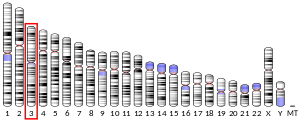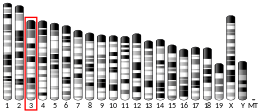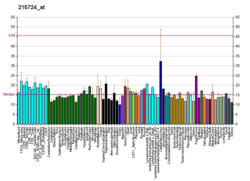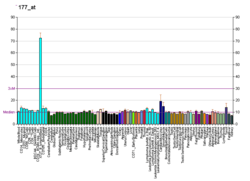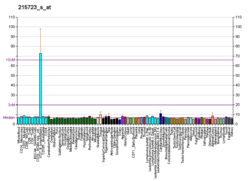Phospholipase D1
Phospholipase D1 is an enzyme that in humans is encoded by the PLD1 gene.[5][6]
Function
Phosphatidylcholine (PC)-specific phospholipases D (PLDs) EC 3.1.4.4 catalyze the hydrolysis of PC to produce phosphatidic acid and choline. A range of agonists acting through G protein-coupled receptors and receptor tyrosine kinases stimulate this hydrolysis. PC-specific PLD activity has been implicated in numerous cellular pathways, including signal transduction, membrane trafficking, and the regulation of mitosis (Hammond et al., 1995).[supplied by OMIM][7]
Interactions
Phospholipase D1 has been shown to interact with:
Inhibitors
- VU-0359595: 1,700-fold selective versus phospholipase D2, IC50 = 3.7nM.[17]
gollark: I kind of miss Windows Phones/
gollark: Slowly, though.
gollark: This is probably in preparation for the inevitable macOS/iOS merger.
gollark: Ah yes, switching architecture, what could POSSIBLY GO WRONG?
gollark: Oh, so it's a worse version of GTech Lavacubes™.
References
- GRCh38: Ensembl release 89: ENSG00000075651 - Ensembl, May 2017
- GRCm38: Ensembl release 89: ENSMUSG00000027695 - Ensembl, May 2017
- "Human PubMed Reference:". National Center for Biotechnology Information, U.S. National Library of Medicine.
- "Mouse PubMed Reference:". National Center for Biotechnology Information, U.S. National Library of Medicine.
- Park SH, Chun YH, Ryu SH, Suh PG, Kim H (February 1999). "Assignment of human PLD1 to human chromosome band 3q26 by fluorescence in situ hybridization". Cytogenet Cell Genet. 82 (3–4): 224. doi:10.1159/000015105. PMID 9858822.
- Hammond SM, Altshuller YM, Sung TC, Rudge SA, Rose K, Engebrecht J, Morris AJ, Frohman MA (January 1996). "Human ADP-ribosylation factor-activated phosphatidylcholine-specific phospholipase D defines a new and highly conserved gene family". J Biol Chem. 270 (50): 29640–3. doi:10.1074/jbc.270.50.29640. PMID 8530346.
- "Entrez Gene: PLD1 phospholipase D1, phosphatidylcholine-specific".
- Ahn BH, Rhim H, Kim SY, Sung YM, Lee MY, Choi JY, Wolozin B, Chang JS, Lee YH, Kwon TK, Chung KC, Yoon SH, Hahn SJ, Kim MS, Jo YH, Min DS (April 2002). "alpha-Synuclein interacts with phospholipase D isozymes and inhibits pervanadate-induced phospholipase D activation in human embryonic kidney-293 cells". J. Biol. Chem. 277 (14): 12334–42. doi:10.1074/jbc.M110414200. PMID 11821392.
- Lee C, Kim SR, Chung JK, Frohman MA, Kilimann MW, Rhee SG (June 2000). "Inhibition of phospholipase D by amphiphysins". J. Biol. Chem. 275 (25): 18751–8. doi:10.1074/jbc.M001695200. PMID 10764771.
- Walker SJ, Wu WJ, Cerione RA, Brown HA (May 2000). "Activation of phospholipase D1 by Cdc42 requires the Rho insert region". J. Biol. Chem. 275 (21): 15665–8. doi:10.1074/jbc.M000076200. PMID 10747870.
- Zhang Y, Redina O, Altshuller YM, Yamazaki M, Ramos J, Chneiweiss H, Kanaho Y, Frohman MA (November 2000). "Regulation of expression of phospholipase D1 and D2 by PEA-15, a novel protein that interacts with them". J. Biol. Chem. 275 (45): 35224–32. doi:10.1074/jbc.M003329200. PMID 10926929.
- Oishi K, Takahashi M, Mukai H, Banno Y, Nakashima S, Kanaho Y, Nozawa Y, Ono Y (May 2001). "PKN regulates phospholipase D1 through direct interaction". J. Biol. Chem. 276 (21): 18096–101. doi:10.1074/jbc.M010646200. PMID 11259428.
- Luo JQ, Liu X, Hammond SM, Colley WC, Feig LA, Frohman MA, Morris AJ, Foster DA (June 1997). "RalA interacts directly with the Arf-responsive, PIP2-dependent phospholipase D1". Biochem. Biophys. Res. Commun. 235 (3): 854–9. doi:10.1006/bbrc.1997.6793. PMID 9207251.
- Kim JH, Lee SD, Han JM, Lee TG, Kim Y, Park JB, Lambeth JD, Suh PG, Ryu SH (July 1998). "Activation of phospholipase D1 by direct interaction with ADP-ribosylation factor 1 and RalA". FEBS Lett. 430 (3): 231–5. doi:10.1016/s0014-5793(98)00661-9. PMID 9688545.
- Genth H, Schmidt M, Gerhard R, Aktories K, Just I (February 2003). "Activation of phospholipase D1 by ADP-ribosylated RhoA". Biochem. Biophys. Res. Commun. 302 (1): 127–32. doi:10.1016/s0006-291x(03)00112-8. PMID 12593858.
- Cai S, Exton JH (May 2001). "Determination of interaction sites of phospholipase D1 for RhoA". Biochem. J. 355 (Pt 3): 779–85. doi:10.1042/bj3550779. PMC 1221795. PMID 11311142.
- Lewis JA, Scott SA, Lavieri R, Buck JR, Selvy PE, Stoops SL, Armstrong MD, Brown HA, Lindsley CW (April 2009). "Design and synthesis of isoform-selective phospholipase D (PLD) inhibitors. Part I: Impact of alternative halogenated privileged structures for PLD1 specificity". Bioorg. Med. Chem. Lett. 19 (7): 1916–20. doi:10.1016/j.bmcl.2009.02.057. PMC 3791604. PMID 19268584.
Further reading
- Hammond SM, Jenco JM, Nakashima S, Cadwallader K, Gu Q, Cook S, Nozawa Y, Prestwich GD, Frohman MA, Morris AJ (1997). "Characterization of two alternately spliced forms of phospholipase D1. Activation of the purified enzymes by phosphatidylinositol 4,5-bisphosphate, ADP-ribosylation factor, and Rho family monomeric GTP-binding proteins and protein kinase C-alpha". J. Biol. Chem. 272 (6): 3860–8. doi:10.1074/jbc.272.6.3860. PMID 9013646.
- Luo JQ, Liu X, Hammond SM, Colley WC, Feig LA, Frohman MA, Morris AJ, Foster DA (1997). "RalA interacts directly with the Arf-responsive, PIP2-dependent phospholipase D1". Biochem. Biophys. Res. Commun. 235 (3): 854–9. doi:10.1006/bbrc.1997.6793. PMID 9207251.
- Colley WC, Sung TC, Roll R, Jenco J, Hammond SM, Altshuller Y, Bar-Sagi D, Morris AJ, Frohman MA (1997). "Phospholipase D2, a distinct phospholipase D isoform with novel regulatory properties that provokes cytoskeletal reorganization". Curr. Biol. 7 (3): 191–201. doi:10.1016/S0960-9822(97)70090-3. PMID 9395408.
- Bae CD, Min DS, Fleming IN, Exton JH (1998). "Determination of interaction sites on the small G protein RhoA for phospholipase D." J. Biol. Chem. 273 (19): 11596–604. doi:10.1074/jbc.273.19.11596. PMID 9565577.
- Lopez I, Arnold RS, Lambeth JD (1998). "Cloning and initial characterization of a human phospholipase D2 (hPLD2). ADP-ribosylation factor regulates hPLD2". J. Biol. Chem. 273 (21): 12846–52. doi:10.1074/jbc.273.21.12846. PMID 9582313.
- Kim JH, Lee SD, Han JM, Lee TG, Kim Y, Park JB, Lambeth JD, Suh PG, Ryu SH (1998). "Activation of phospholipase D1 by direct interaction with ADP-ribosylation factor 1 and RalA". FEBS Lett. 430 (3): 231–5. doi:10.1016/S0014-5793(98)00661-9. PMID 9688545.
- Steed PM, Clark KL, Boyar WC, Lasala DJ (1998). "Characterization of human PLD2 and the analysis of PLD isoform splice variants". FASEB J. 12 (13): 1309–17. doi:10.1096/fasebj.12.13.1309. PMID 9761774.
- Kim JH, Han JM, Lee S, Kim Y, Lee TG, Park JB, Lee SD, Suh PG, Ryu SH (1999). "Phospholipase D1 in caveolae: regulation by protein kinase Calpha and caveolin-1". Biochemistry. 38 (12): 3763–9. doi:10.1021/bi982478+. PMID 10090765.
- Kim Y, Han JM, Park JB, Lee SD, Oh YS, Chung C, Lee TG, Kim JH, Park SK, Yoo JS, Suh PG, Ryu SH (1999). "Phosphorylation and activation of phospholipase D1 by protein kinase C in vivo: determination of multiple phosphorylation sites". Biochemistry. 38 (32): 10344–51. doi:10.1021/bi990579h. PMID 10441128.
- Walker SJ, Wu WJ, Cerione RA, Brown HA (2000). "Activation of phospholipase D1 by Cdc42 requires the Rho insert region". J. Biol. Chem. 275 (21): 15665–8. doi:10.1074/jbc.M000076200. PMID 10747870.
- Suzuki J, Yamazaki Y, Li G, Kaziro Y, Koide H, Guang L (2000). "Involvement of Ras and Ral in chemotactic migration of skeletal myoblasts". Mol. Cell. Biol. 20 (13): 4658–65. doi:10.1128/MCB.20.13.4658-4665.2000. PMC 85875. PMID 10848592.
- Zhang Y, Redina O, Altshuller YM, Yamazaki M, Ramos J, Chneiweiss H, Kanaho Y, Frohman MA (2001). "Regulation of expression of phospholipase D1 and D2 by PEA-15, a novel protein that interacts with them". J. Biol. Chem. 275 (45): 35224–32. doi:10.1074/jbc.M003329200. PMID 10926929.
- Divecha N, Roefs M, Halstead JR, D'Andrea S, Fernandez-Borga M, Oomen L, Saqib KM, Wakelam MJ, D'Santos C (2000). "Interaction of the type Ialpha PIPkinase with phospholipase D: a role for the local generation of phosphatidylinositol 4, 5-bisphosphate in the regulation of PLD2 activity". EMBO J. 19 (20): 5440–9. doi:10.1093/emboj/19.20.5440. PMC 314009. PMID 11032811.
- Oishi K, Takahashi M, Mukai H, Banno Y, Nakashima S, Kanaho Y, Nozawa Y, Ono Y (2001). "PKN regulates phospholipase D1 through direct interaction". J. Biol. Chem. 276 (21): 18096–101. doi:10.1074/jbc.M010646200. PMID 11259428.
- Cai S, Exton JH (2001). "Determination of interaction sites of phospholipase D1 for RhoA". Biochem. J. 355 (Pt 3): 779–85. doi:10.1042/bj3550779. PMC 1221795. PMID 11311142.
- Lee S, Park JB, Kim JH, Kim Y, Kim JH, Shin KJ, Lee JS, Ha SH, Suh PG, Ryu SH (2001). "Actin directly interacts with phospholipase D, inhibiting its activity". J. Biol. Chem. 276 (30): 28252–60. doi:10.1074/jbc.M008521200. PMID 11373276.
- Hughes WE, Parker PJ (2001). "Endosomal localization of phospholipase D 1a and 1b is defined by the C-termini of the proteins, and is independent of activity". Biochem. J. 356 (Pt 3): 727–36. doi:10.1042/0264-6021:3560727. PMC 1221899. PMID 11389680.
- Min DS, Ahn BH, Jo YH (2002). "Differential tyrosine phosphorylation of phospholipase D isozymes by hydrogen peroxide and the epidermal growth factor in A431 epidermoid carcinoma cells". Mol. Cells. 11 (3): 369–78. PMID 11459228.
This article is issued from Wikipedia. The text is licensed under Creative Commons - Attribution - Sharealike. Additional terms may apply for the media files.
